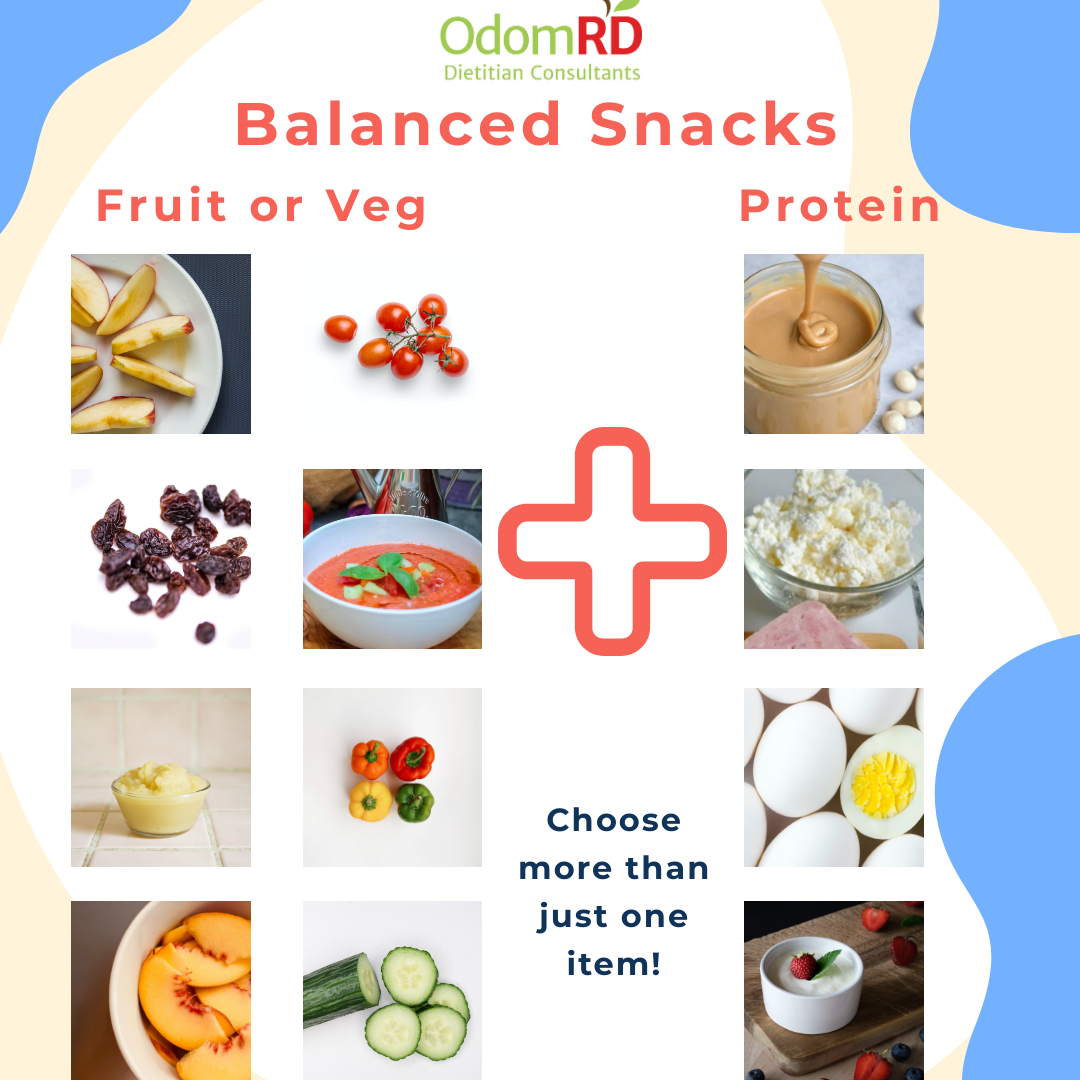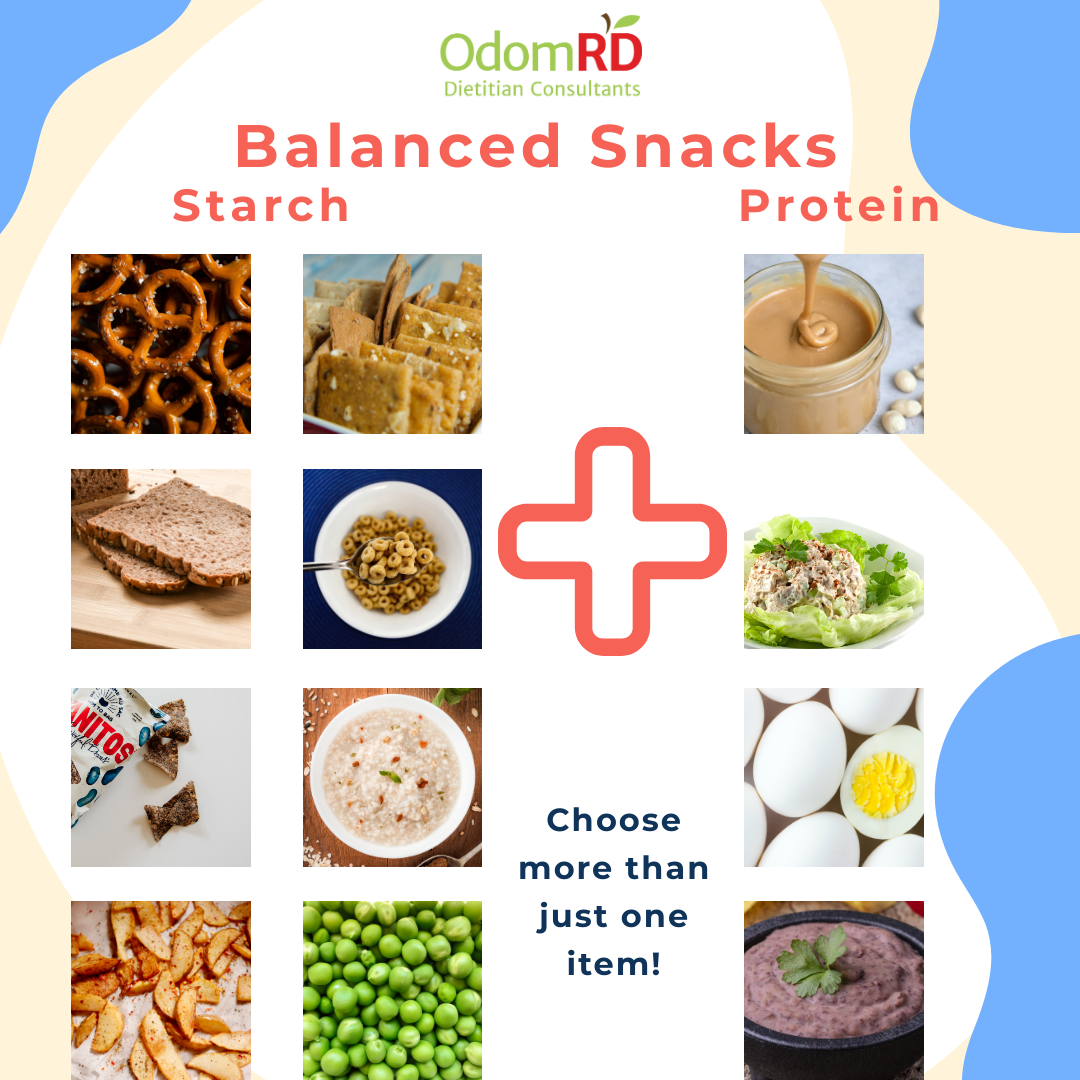Snacks between meals help stabilize weight and improve intake when appetite is low or fullness occurs quickly. Balanced snacks are encouraged, meaning we combine two food groups to create a satisfying and nutritious solution that helps with our weight. However, chewing and swallowing problems are common for seniors, and it’s important to think about healthy snacks that they can eat.
Balanced Snacks
When we think of balanced meals, this includes components from the starch, protein, fruit/vegetable food categories. Snacks, however, have a different expectation for balance, and combinations are best for more well-rounded nutrition and satiety. Protein at snacks is recommended, especially if meeting protein needs is difficult:
|
Fruit/Veg + Protein: 1 tbsp raisins + peanuts ½ c Applesauce + almonds ½ c pineapple + ½ c cottage cheese ½ c peaches + ½ c yogurt ½ c cherry tomatoes + 1 oz cheese ½ c gazpacho + ½ c plain yogurt or cottage cheese ½ c bell peppers + bean dip |
 |
|
Starch + Protein: ½ c Whole grain crackers + peanut butter ½ c Whole grain pretzels + cheese 10 Whole grain chips + bean dip 1 slice Whole grain bread + bean dip 1 slice of whole grain bread + soft cheese 1 slice of whole grain bread + chicken, tuna, egg salad ½ c crackers + 1 hard boiled egg |
 |
Beverages:
Milk: Packed with plenty of nutrients, carbohydrates, fats, and protein, this can help meet needs! Lactose-free milk is available for those that have tolerance issues. Soy milk is a good alternative that offers similar protein content. However, be cautious of other plant-based milks, as nutritional value can vary.
Mixing 1/2 c juice and 1/2-1 c milk can also be a tasty treat if desired! Or turn it into a smoothie with 1 tbsp peanut butter, milk, and 1/2-1 c frozen fruit!
Low Calorie Snacks? Low Fat Snacks? Are they worth it?
That depends on several factors, but ultimately, snacks should provide satiety, calories, and a healthful contribution to daily intake. Reducing fat often increases carbohydrates, or reduced sugar snacks sometimes have sugar alcohols that may cause GI upset. If the goal is to maintain weight or improve intake, these are likely not an appropriate choice.
Altered Textures Altered textures are common for people with dysphagia or chewing difficulties. Dysphagia can result after strokes, injuries, illnesses, or many other events. A speech therapist will help determine if this is necessary, and also help determine what level of alteration is needed. Sometimes food just needs to be chopped and moist ("mechanical soft" or "minced and moist"), but sometimes food must be pureed to avoid choking. Some foods may not be appropriate for those on a dysphagia diet.
Snacks for a mechanical soft/minced and moist diet:
1/2 c soft, chopped fruit without skins + 1/2 c cottage cheese
Smoothie with 1 tbsp peanut butter, 1/2 c milk, 1/2 c frozen peaches
Chicken or tuna salad with no crunchy veggies, mashable with a fork
Egg salad without crunchy veggies, mashable with a fork
Purees need to be a smooth consistency without lumps or crunchy bits, like a pudding. They should be scoopable with a spoon and remain cohesive without sticking to the spoon. The following snacks may work:
Pureed cottage cheese + soft fruit
Pureed beans
Pudding
Chicken, tuna, or egg salad pureed to appropriate consistency. Using extra sauces or condiments may help reach puree texture.
Yogurt without lumps or chunks
Smoothies or milk (if liquid consistency is appropriate).
We hope this helps navigate a healthy snacktime! Let OdomRD know how else we can help.
